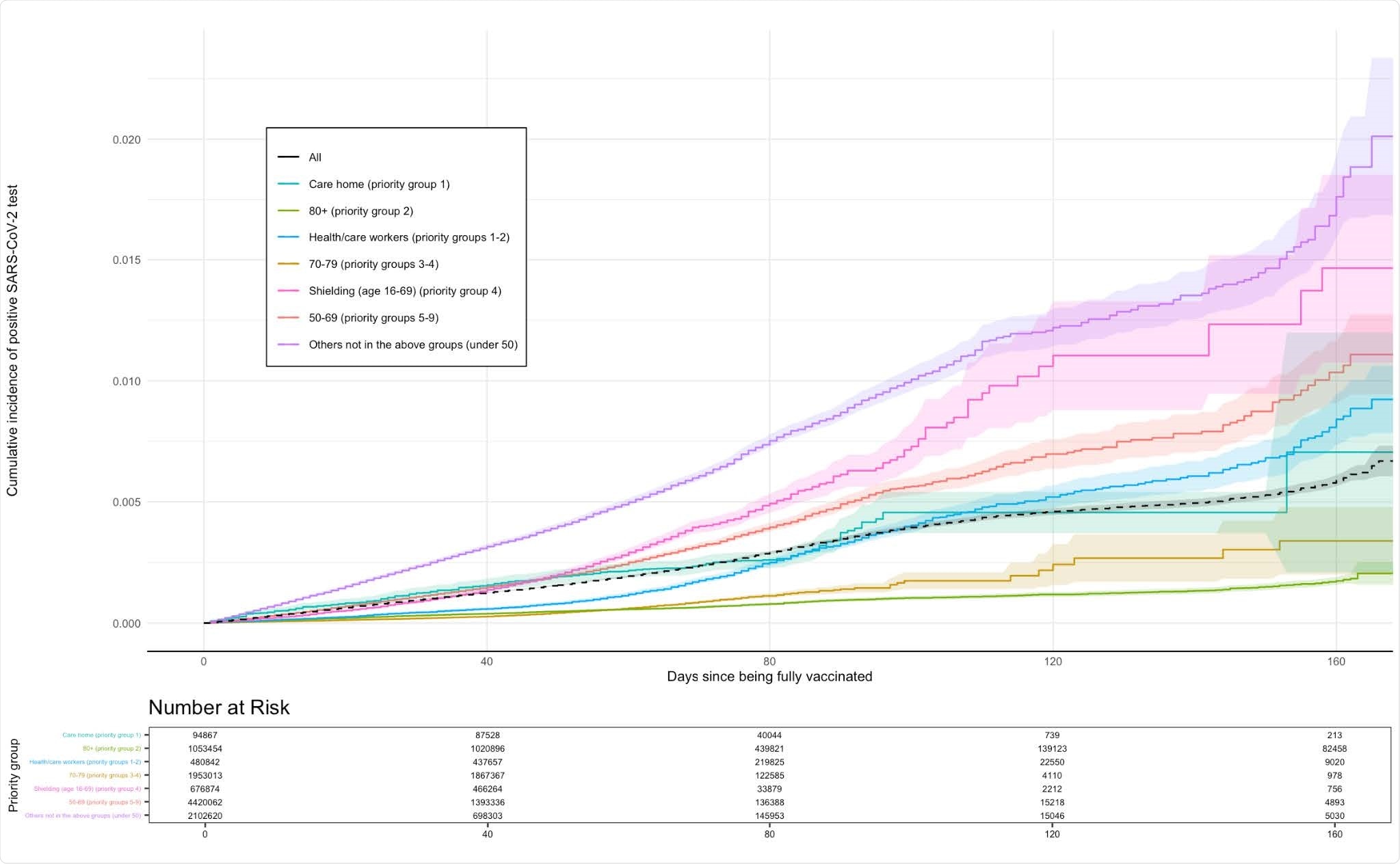A team of UK-based scientists has recently estimated the prevalence of vaccine breakthrough infections and severe disease in a large number of individuals fully vaccinated against coronavirus disease 2019 (COVID-19) in England. The findings reveal that the majority of vaccine breakthrough cases are mild, with only a very small proportion of individuals developing severe COVID-19. The study is currently available on the medRxiv* preprint server.
The mass vaccination campaign against COVID-19 was started in the UK in December 2020. Initially, healthcare and other frontline workers, care home residents, older adults, and high-risk individuals were prioritized for the vaccination. Afterward, the remaining adults received the vaccination in order of decreasing age. By September 2021, about 75% of individuals aged over 16 years were fully vaccinated.
Real-world evidence on vaccine efficacy has suggested that COVID-19 vaccines are highly effective in preventing severe acute respiratory syndrome coronavirus 2 (SARS-CoV-2) infection and severe disease. However, the emergence of vaccine breakthrough cases has highlighted the need for identifying the risk factors responsible for reducing vaccine efficacy.
In the current study, the scientists have estimated the prevalence of vaccine breakthrough cases and COVID-19-related hospitalization and deaths in a large number of fully vaccinated individuals in England.
Study design
The scientists collected vaccination data from the OpenSAFELY-TPP database which contains information of approximately 40% of the England population. A total of 10,782,870 individuals were identified as fully vaccinated. A person was considered fully vaccinated after 14 days of receiving the second vaccine dose. The participants were followed up for an average of 43 days.
The scientists assessed the number of breakthrough infections, hospital admission, and mortality in fully vaccinated participants. The participants were categorized into seven priory groups, including care home residents, older adults aged above 80 years, 70 – 79 years, and 50 – 69 years, healthcare/frontline workers, clinically highly vulnerable individuals, and other at-risk individuals.
Important observations
About 0.2% of fully vaccinated individuals were identified to have breakthrough infections. The average duration to have a positive SARS-CoV-2 test result was 23 days. For every 1000 years of patient follow-up time, the corresponding incidence rate was 12.33. Among different priority groups, the highest prevalence of breakthrough infection was observed in clinically vulnerable individuals and lowest in older adults aged above 80 years. After 150 days of study commencement, the overall prevalence was less than 0.01%.
A reduction in vaccine breakthrough infection rate was observed with increasing age. In addition, the prevalence was comparatively higher in females than males and lowered in White individuals than those belonging to other ethnic groups.
Among various comorbidities, renal replacement therapy, organ transplantation, hematological malignancy, and immunosuppression were associated with the highest prevalence of breakthrough infections. Importantly, the highest risk of infection was observed within 4 weeks after full vaccination. However, the risk reduced gradually with time since the last vaccination.

Kaplan-Meir plot for positive SARS-CoV-2 test over time, by priority group
Hospitalization due to severe COVID-19
About 0.01% of fully vaccinated individuals were admitted to hospitals due to COVID-19. The average time to hospitalization was 33 days. Among hospitalized patients, about 73% had a SARS-CoV-2-positive test result in their record. Of these infections, 25% occurred before hospital admission, 21% occurred within two days of admission, 38% occurred between 3 and 29 days after admission, and 16% occurred after 30 days of admission.
An induction in hospitalization rate was observed with increasing age. The risk was 3-fold higher among Asian and Asian British individuals compared to White individuals. Similarly, socioeconomically deprived individuals showed a higher risk of hospitalization.
The comorbidities associated with an increased infection rate were also found to increase the risk of hospitalization. The lowest rate of hospitalization was observed within 4 weeks after full vaccination. The rate increased gradually with time since the last vaccination.
Hospitalization due to severe COVID-19
The mortality rate among fully vaccinated individuals was much less than 0.01%. The average time to death was 40 days. The highest mortality rate was observed among older adults aged over 80 years who lived in care homes. The number of deaths among individuals aged under 60 years was negligible. Importantly, a 5-fold higher mortality rate was observed in the West Midlands compared to the South West.
Among various comorbidities, hematological malignancy, organ transplant, and kidney disease were associated with the highest mortality rate. In addition, immunocompromised and respiratory disease patients exhibited a higher risk of COVID-19 related mortality.
Study significance
The study findings reveal that the majority of vaccine breakthrough cases in England are associated with mild infections. Only a very small fraction of fully vaccinated individuals develop severe or fatal COVID-19.